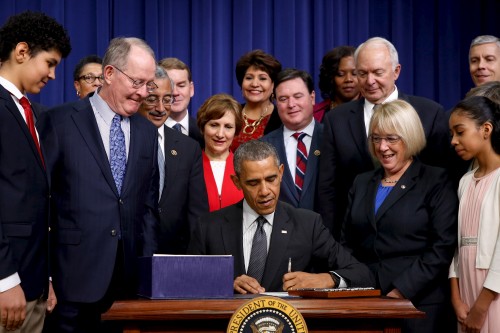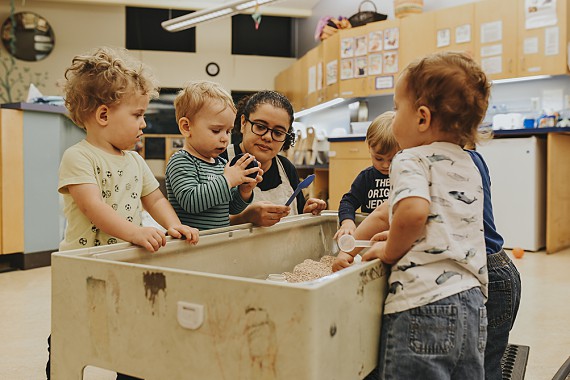The process of growing curious, engaged, and capable lifelong learners begins long before elementary school. Research clearly points to the importance of early learning experiences for optimal brain development in children from birth to age five. Learn more about brain development and early learning.
 Advancing high-quality early learning opportunities with ESSA
Advancing high-quality early learning opportunities with ESSA
ESSA has provided states with opportunities to strengthen their early learning systems and realize their goals for high-quality preschool. As part of the law, states are required to develop an ESSA implementation plan that addresses early learning as a fundamental component of education.
The Oregon Department of Education (ODE) has written a draft ESSA implementation plan and is seeking public comment on the plan until Monday, January 16, 2017. ODE’s draft framework for implementation does not include any explicit strategies to support early learning. As a member of the ESSA advisory committee, Children’s Institute knows that any plan to improve and strengthen education for Oregon’s children must include a plan for high-quality early learning. The legislation makes clear that early education must be aligned with the K-12 education system to reach the goals of career and college readiness.
Oregon has one of the worst graduation rates in the country and we know the causes of low high school graduation rates do not begin in high school. The first eight years of life, when children experience their most profound growth cognitively, socially, and emotionally, are critical to lifelong development. At-risk children who do not access high-quality early education are 25 percent more likely to drop out of school, 50 percent more likely to need special education intervention, and 60 percent less likely to attend college.
Upon entering kindergarten, 37 percent of Oregon children could not identify a single letter and 25 percent lacked critical self-regulation skills, a key predictor of later success. When compared to many other states, Oregon has invested little in the critical years from birth to eight years-old. Oregon ranks in the bottom quarter of states nationwide for access to state funded preschool, enrolling only eight percent of all three and four year-olds, regardless of income. Moreover, only six percent of eligible children ages birth to three years-old are enrolled in Early Head Start, and only 50 percent of eligible children ages three to five are enrolled in Oregon Pre-Kindergarten/Head Start.
 Oregon must seize the opportunity to expand high-quality early learning
Oregon must seize the opportunity to expand high-quality early learning
With all that is at stake for Oregon’s children, Oregon’s ESSA implementation plan should focus on closing achievement and opportunity gaps and increasing access to high-quality early learning.
To ensure that Oregon’s implementation plan reflects the importance of early learning, you can offer the following responses to questions 9, 13, 14, 19 and 21 in the draft ESSA implementation survey:
- Commit to supporting formative assessments that are useful for teachers to improve teaching, especially in Kindergarten through 2nd grade. (Q. 9)
- Incorporate measures for early learning and health into needs assessment for Title I funded schools with Schoolwide Program Plans.
- Report early learning and health indicators in school report cards and ensure all report card measures have data disaggregated by race/ethnicity, special education, and English Language Learners. (Q. 13)
- Ensure school report cards help parents easily understand how their local schools are doing and that school ratings place increased importance on the outcomes for children of color, children in special education, and English Language Learners. (Q. 14)
- Prioritize preparing more diverse teachers across preschool through 12th grade utilizing scholarships, peer mentors, alternative scheduling for college coursework, and improved content and practical experience in teacher preparation programs for working with diverse learners. (Q. 19)
- Support the 50+ school districts currently running preschool by providing guidance on how to provide high quality preschool, train school leaders in best practices in early childhood, and fund shared professional development between preschool and kindergarten teachers. (Q. 21)
You can also provide your input on the early learning aspects and the entirety of Oregon’s ESSA implementation. Thank you.
Related content
Integrating Early Education into State ESSA Plans
The Difference Between ESSA and NCLB
Opportunities in ESSA for Improving Early Education
ESSA and Early Childhood Education: Opportunities for State Leadership
